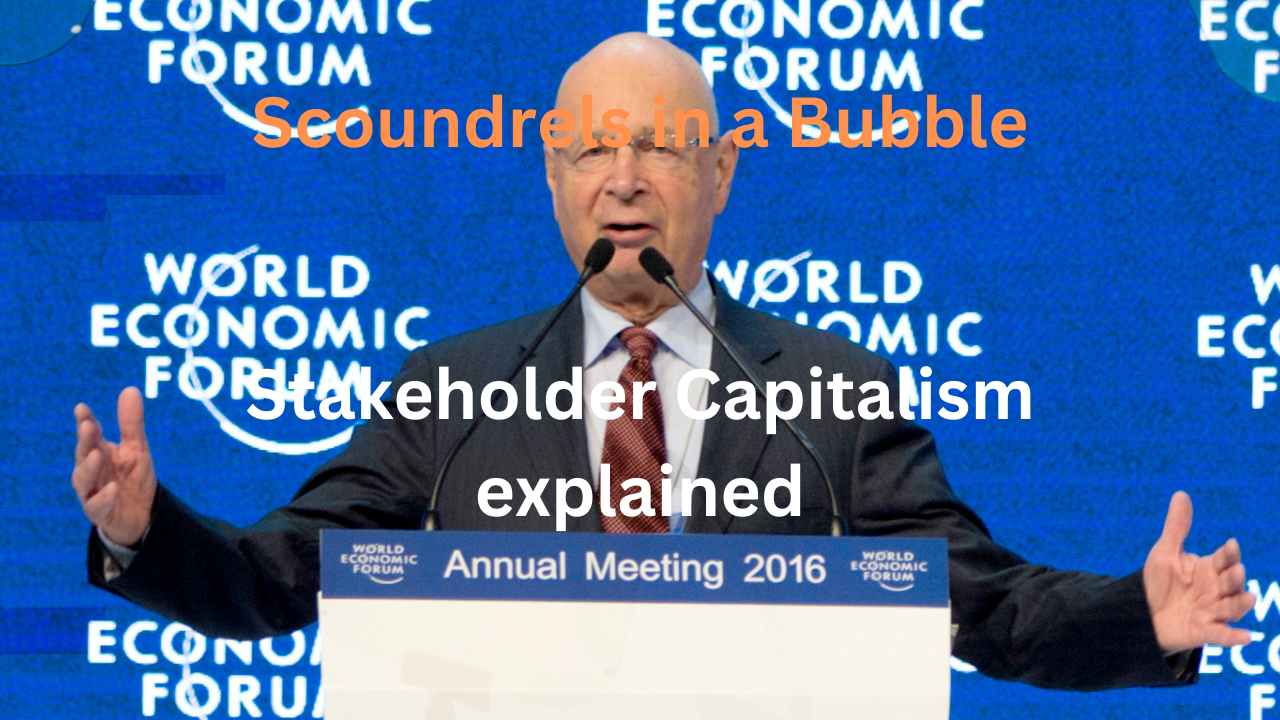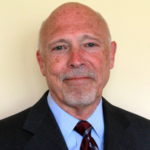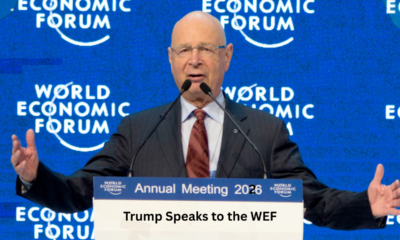Executive
Scoundrels in a Bubble
Stakeholder capitalism forms the basis of the Great Reset. It is also an inherently flawed model for running a world.

Stakeholder capitalism is the centerpiece of Klaus Schwab’s Great Reset.
According to Schwab, Founder of the World Economic Forum, and the economic model’s most vocal advocate, the stakeholder capitalism will not only “optimize short-term profits for shareholders, but seek long term value creation, by taking into account the needs of all their stakeholders, and society at large.”
Proponents claim the new capitalism is the inclusive replacement for greedy shareholder capitalism that places investor profits ahead of society.
Beyond this rhetoric you find Schwab’s model is more about redirecting wealth and power to the tip of a global hierarchy than benefiting society at large.
Stakeholder capitalism, the theory that corporations should satisfy more than shareholders dates back to a 1983 paper by R. Edward Freeman. As social awareness increased more companies included employees, suppliers, the community, trade unions, government agencies, financial institutions, and media as stakeholders. Schwab’s Great Reset expands this to myriad global interests.
You can build cases for or against expanding community stakeholders. But community concern is not what drives Schwab’s stakeholder model.
The flaws in Schwab’s anti-shareholder message
Contrary to Schwab’s account, shareholder companies do look beyond their investors. Most companies earn profits by providing quality goods and services at competitive prices customers can afford. Smart companies know this happens best when they care for employees, suppliers, customers, and everyone who effects the business. Together, these factors increase the company’s and shareholders’ value.
In other words, in the shareholder model customers are at the top of the corporate food chain and are the ultimate decider of the company’s fate. No matter how socially aware a firm may be, if the customers are not satisfied it will soon be another CNN+.
In any model there will be some business leaders focused only on profits. But this shortcoming pales when compared to the Great Reset’s handful of the uber-rich managing the entire planet.
Corporate greed is blamed for increasing global risks
According to Schwab, global risks including extreme weather, biodiversity collapse, food and water crises are interconnected. They are exacerbated by inequality and unfairness.
Schwab places much of the blame on corporate greed. Too many CEOs, he claims in his 2021 DAVOS speech, have focused on shareholders and failed to follow the UN’s Sustainable Development Goals.
There you have the core of Schwab’s scheme. He wants to implement an updated version of the 1992 Earth Summit’s Sustainable Development goals using big business as the hammer that drives the practices into our culture.
Who is the “society at large” that will benefit
When Schwab refers to stakeholders, he speaks globally as well as nationally. His stakeholders include communities, governments, the welfare state, trade associations, global stakeholders, the planet, and anyone else the power elite decides to add.
If you think you will personally benefit, you may have a long wait. Under the Great Reset, stakeholders are ‘the people.’ When a politician says, “I’m doing this for the people,” watch out. Castro, Mao, Chavez and nearly every despot born acted ‘for the people.’
This massive “stakeholder” pool is the real target of governments. By leveraging big business, they have easy access to control the behaviors and property of large populations.
According to the DAVOS agenda, the new aim of companies is “to generate an economic surplus” so governments can assure the “greatest prosperity for the greatest number of people.”
How stakeholder capitalism leads to government control
Under the broad stakeholder model, governments hold companies accountable through environmental, social, and governance (ESG) performance scorecards. Activities such as minimizing environmental externalities, volunteerism, reducing greenhouse gas emissions, diversity in the interview process all can raise their ESG score. Higher scores provide more favorable credit terms and easier access to suppliers and contracts.
A proposed SEC rule will be the first step in regulating these activities in the U.S.. Under “The Enhancement and Standardization of Climate-Related Disclosures for Investors,” public companies must provide climate related information in their annual reports. This includes items like GHG reduction measures and climate risks.
Here are some examples:
- “…a registrant in the construction industry might be required to disclose the physical risk of increased heat waves that affect the ability of its personnel to safely work outdoors, which could result in a cessation or delay of operations, and a reduction in its current or future earnings.”
- The rule requires companies to look for “climate related opportunities” such as transitioning to “a lower carbon economy.”
Enter the stakeholders that give stakeholder capitalism its name
The SEC rule also requires public companies to report the GHG reductions and climate initiatives for their customers, suppliers, and firms “upstream or downstream” in the value chain. This mandate provides the federal government with access to virtually every small business in the nation.
It is not just access to these small business stakeholders; the government has control over them. Even smaller businesses that fail to follow the ESG system of governance will find it harder to gain funding, suppliers, and access to markets.
To meet ESG standards companies will be forced to redirect their primary concerns from providing excellent products at competitive prices to satisfying government mandated social scoring criteria.
According to Schwab,
“We can’t continue with an economic system driven by selfish values, such as short-term profit maximization, the avoidance of tax and regulation, or the externalizing of environmental harm. Instead, we need a society, economy, and international community that is designed to care for all people and the entire planet.”
It’s ironic Schwab complains about selfish values when his entire Great Reset project transfers the world’s power to a handful of unelected elites.
The expanded universe of non-business stakeholders might never invest in, buy, or even use a company’s product or service. But since businesses will be required to meet many of their environmental or social demands, they can profoundly influence a company’s bottom line.
Is this woke or is it not?
Proponents claim stakeholder capitalism addresses inequality and protects the environment.
Schwab explains, “the interconnectivity and the overarching well-being of people and the planet are central, ensuring a more harmonious outcome over time.”
This cuddly comment obscures the reality that those most responsible for division, inequality, unemployment, inflation, and debt are the same people who will manage the criteria governing how banks give loans, corporations conduct business, and who acts responsibly. Downstream these same people make decisions that will affect the amount you will have to spend on your home, your car, or vacation.
Responding to a backlash accusing stakeholder proponents of advancing political wokeism, BlackRock CEO, Larry Fink, a major player in the scheme declared, “Stakeholder capitalism is not about politics. It is not a social or ideological agenda. It is not ‘woke.’”
Right. “Not woke” in the same way mask mandates and vaccine passports are not control.
But why would BlackRock, the largest asset management firm on earth, support stakeholder capitalism when the sustainable industries it favors, like wind and solar, rely on government subsidies to survive?
Sustainability drives up housing prices and production costs all to solve a problem that doesn’t exist. So, how can asset managers predict huge windfalls in industries that are struggling?
An endless supply of money
The answer is money. Broad stakeholder capitalism only survives where there are enormous cash inflows. If that money is not coming from consumers, then much of it comes from government.
Despite operating in the red, the federal government managed to budget $4.6 trillion dollars for pandemic relief. So palpable was their financial ineptitude $100 billion of that was lost, and billions more were spent on green infrastructure, environmental justice, hotels, and ski slopes, and other projects barely pandemic related.
That inflow is not about to cease. Modern Monetary Theory is the support mechanism for the new economy. The absurd theory that is gaining traction in Washington states that since we can print limitless sums of money, it doesn’t matter if we run meteoric debts. We just print more money (think digital credits) and spend our way forward.
If that does not concern you, consider that MMT passes more power to the President and Congress to control financial flow to address inflation.
… essential to stakeholder capitalism
There are a basketful of other problems with Modern Monetary Theory I will hit in a later article. For now, know MMT, with its massive amounts of cash is the fuel that enables the Great Reset to advance Marxist-like control over our entire economy with socially sensitive cliches rather than threats, gulags, and mass killings.
That money can prop up fading wind turbine manufacturers, support expensive battery production for electric cars, keep struggling environmentally conscious firms afloat, and underwrite green infrastructure for new schools.
The Great Reset calls for a select group of corporations and political elite to lord it over the entire economy. Stakeholder capitalism, with its emphsis on community, gives this control a veneer of legitimacy while strengthening the bonds of compliance. Companies including Microsoft, Accenture, Bank of America, Disney, and John Deere are already on the ESG bandwagon.
Conclusion
If the pandemic has taught us anything it is that political and corporate elitists live in a deaf, irresponsible, selfish, and power-crazed bubble. Many of society’s pains are caused by those who have regulated beyond their moral and intellectual means.
Any flaws in our economic system are better managed by the millions of men and women who operate small businesses and those they serve, than by the scoundrels in the bubble.
From author’s site on Substack; appears by permission.
John Anthony, Founder of Sustainable Freedom Lab, LLC, is a nationally acclaimed speaker, researcher and writer. He is a leading expert on globalist impacts on local affairs and the effects of federal agency regulations on local rule and property rights. Mr. Anthony’s Property Value Defense Network informs public officials and attorneys nationwide of the dangers of regulatory laws. His workshop, Shattering America’s Trance, teaches conservatives effective techniques for cross-political communications and is now available as an online course.
-

 Accountability3 days ago
Accountability3 days agoWaste of the Day: Principal Bought Lobster with School Funds
-

 Civilization13 hours ago
Civilization13 hours agoWhy Europe Shouldn’t Be Upset at Trump’s Venezuelan Actions
-

 Executive2 days ago
Executive2 days agoHow Relaxed COVID-Era Rules Fueled Minnesota’s Biggest Scam
-

 Constitution3 days ago
Constitution3 days agoTrump, Canada, and the Constitutional Problem Beneath the Bridge
-

 Christianity Today12 hours ago
Christianity Today12 hours agoSurprising Revival: Gen Z Men & Highly Educated Lead Return to Religion
-

 Civilization2 days ago
Civilization2 days agoThe End of Purple States and Competitive Districts
-

 Executive1 day ago
Executive1 day agoWaste of the Day: Can You Hear Me Now?
-

 Executive5 days ago
Executive5 days agoTwo New Books Bash Covid Failures














